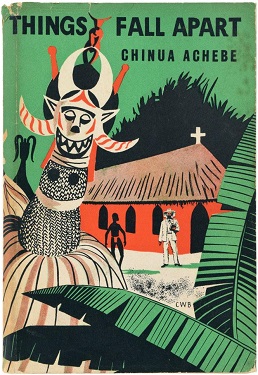Things Fall Apart

Things Fall Apart is the debut novel by Nigerian author Chinua Achebe, first published in 1958. It depicts pre-colonial life in the southeastern part of Nigeria and the arrival of Europeans during the late 19th century. It is seen as the archetypal modern African novel in English, and one of the first to receive global critical acclaim. It is a staple book in schools throughout Africa and is widely read and studied in English-speaking countries around the world. The novel was first published in the UK in 1962 by William Heinemann Ltd, and became the first work published in Heinemann’s African Writers Series.
The novel follows the life of Okonkwo, an Igbo (“Ibo” in the novel) man and local wrestling champion in the fictional Nigerian clan of Umuofia. The work is split into three parts, with the first describing his family, personal history, and the customs and society of the Igbo, and the second and third sections introducing the influence of European colonialism and Christian missionaries on Okonkwo, his family, and the wider Igbo community.
Things Fall Apart was followed by a sequel, No Longer at Ease (1960), originally written as the second part of a larger work along with Arrow of God (1964). Achebe states that his two later novels A Man of the People (1966) and Anthills of the Savannah (1987), while not featuring Okonkwo’s descendants, are spiritual successors to the previous novels in chronicling African history.
The novel’s protagonist, Okonkwo, is famous in the villages of Umuofia for being a wrestling champion, defeating a wrestler nicknamed “Amalinze The Cat” (because he never lands on his back). Okonkwo is strong, hard-working, and strives to show no weakness. He wants to dispel his father Unoka’s tainted legacy of unpaid debts, a neglected wife and children, and cowardice at the sight of blood. Okonkwo works to build his wealth entirely on his own, as Unoka died a shameful death and left many unpaid debts. He is also obsessed with his masculinity, and any slight compromise to this is swiftly destroyed. As a result, he often beats his wives and children, and is unkind to his neighbours. However, his drive to escape the legacy of his father leads him to be wealthy, courageous, and powerful among the people of his village. He is a leader of his village, having attained a position in his society for which he has striven all his life.[1]
Okonkwo is selected by the elders to be the guardian of Ikemefuna, a boy taken by the clan as a peace settlement between Umuofia and another clan after Ikemefuna’s father killed an Umuofian woman. The boy lives with Okonkwo’s family and Okonkwo grows fond of him, although Okonkwo does not show his fondness so as not to appear weak. The boy looks up to Okonkwo and considers him a second father. The Oracle of Umuofia eventually pronounces that the boy must be killed. Ezeudu, the oldest man in the village, warns Okonkwo that he should have nothing to do with the murder because it would be like killing his own child – but to avoid seeming weak and feminine to the other men of the village, Okonkwo disregards the warning from the old man, striking the killing blow himself even as Ikemefuna begs his “father” for protection. For many days after killing Ikemefuna, Okonkwo feels guilty and saddened.
Shortly after Ikemefuna’s death, things begin to go wrong for Okonkwo. He falls into a great depression, as he has been greatly traumatized by the act of murdering his own adopted son. His sickly daughter Ezinma falls unexpectedly ill and it is feared she may die; during a gun salute at Ezeudu’s funeral, Okonkwo’s gun accidentally explodes and kills Ezeudu’s son. He and his family are exiled to his motherland, the nearby village Mbanta, for seven years to appease the gods he has offended.
